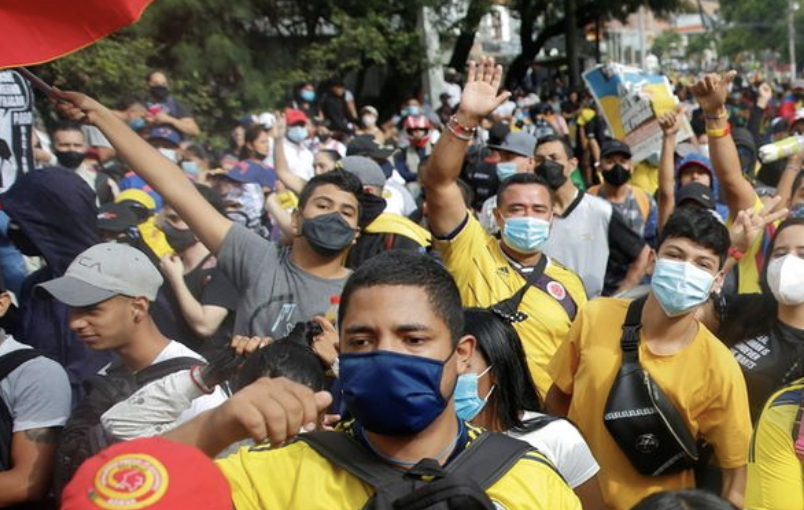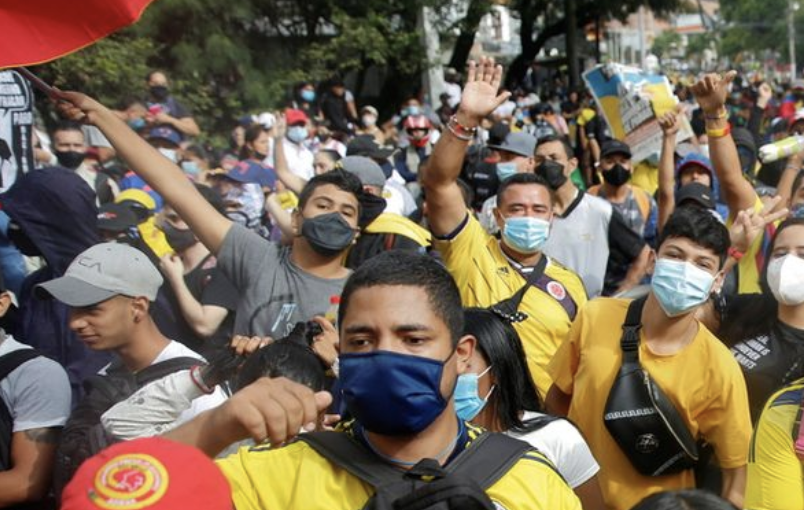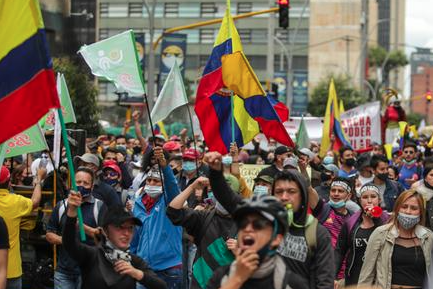
Jun 23, 2021 | Incidencia
La CIJ y 300 organizaciones de la sociedad civil, presentaron una declaración conjunta ante el Consejo de Derechos Humanos de Naciones Unidas expresando su preocupación sobre la situación de derechos humanos en Colombia, en el marco de la presentación del informe anual de la Alta Comisionada de la ONU para los Derechos Humanos.
Aqui sigue la declaración oral conjunta:
“Gracias Sra. Presidenta,
En nombre de las varias organizaciones firmantes, agradecemos el reporte de actividades de la Alta Comisionada, particularmente sobre Colombia. La situación en el país confirma la necesidad de continuar el monitoreo y la asistencia técnica de su oficina.
A ocho semanas de las jornadas de movilización en distintas ciudades del país, los asesinatos, el uso excesivo de la fuerza, los actos constitutivos de tortura y otros malos tratos, las desapariciones forzadas, la violencia sexual, las detenciones arbitrarias y los ataques, incluidos los ciberataques contra quienes ejercen su derecho a protestar constituyen flagrantes violaciones de derechos humanos. Los abusos se producen a pesar del fallo de la Corte Suprema de Justicia, que insta a la Fuerza Pública a no actuar de manera violenta, arbitraria y sistemática durante las manifestaciones y los llamamientos de mecanismos de derechos humanos a cesar estas violaciones.
Las protestas se vinculan a reivindicaciones estructurales ligadas a los derechos humanos, incluyendo la pobreza, la desigualdad, injusticias sociales crecientes, la impunidad, el racismo sistémico y la violencia sistemática contra las personas defensoras de derechos humanos, incluyendo líderes sociales, campesinas, sindicales e indígenas y la prensa. También se deben a la falta de la plena implementación del Acuerdo de Paz de 2016.
Exhortamos al Consejo a exigir a Colombia el cese del uso de violencia y el respeto del derecho a la protesta pacífica; a que investigue de forma independiente las violaciones a los derechos humanos cometidas en este contexto; a que acepte la visita de los procedimientos Especiales y a que apoye el logro de consensos sociales en torno a las demandas estructurales.
Finalmente, solicitamos a la Alta Comisionada, que por medio del monitoreo de su oficina en Colombia, elabore un reporte sobre las violaciones de derechos humanos cometidas durante las protestas.
Gracias Sra. Presidenta.”

Jun 23, 2021 | Advocacy, Non-legal submissions
The ICJ joined over 300 civil society organisations in a statement to the UN Human Rights Council to express deep concern about the situation of human rights in Colombia during the presentation of the annual report of the UN High Commissioner for Human Rights.
The statement reads as follows:
“Thank you Madam President,
On behalf of the undersigned organisations, we thank the High Commissioner for her annual report, particularly on activities undertaken in Colombia. The situation in the country confirms the need for continued monitoring and provision of technical assistance by her Office
Throughout the eight weeks of mass protests that have spread to different cities throughout the country, we’ve seen killings, excessive use of force, acts amounting to torture and other ill-treatment, enforced disappearances, sexual violence, arbitrary detentions and attacks, including cyber-attacks against those exercising their right to protest, all of which constitute flagrant human rights violations. These violations are taking place in spite of a Supreme Court ruling ordering the security forces to refrain from acting violently and arbitrarily in a systemic manner during demonstrations, and calls by human rights mechanisms to cease these violations.
The protests are rooted in structural demands linked to the respect for human rights, and other concerns including poverty, inequality, growing social injustices, impunity, systemic racism and systematic violence against human rights defenders -including social, campesino, trade union and indigenous leaders and the press. They are also a result of the continued failure to fully implement the 2016 Peace Accord.
We urge the Council to call on Colombia to cease the use of violence and to respect the right to peaceful protest; to independently investigate human rights violations committed in this context; to accept the visit of the Special Procedures; and facilitate the building of social consensus around structural demands.
Finally, we ask the High Commissioner, through her Office in Colombia, to prepare a report on the human rights violations committed during the protests.
Thank you Madam President.”

Jun 22, 2021 | Comunicados de prensa, Informes, Noticias, Publicaciones
La CIJ, en un informe que presentó hoy, afirmó que el Poder Judicial de Venezuela se ha convertido en una herramienta para que el Poder Ejecutivo controle políticamente al país, en lugar de ser un mecanismo de defensa del Estado de derecho en el país.
El informe Jueces en la cuerda floja de 58 páginas, documenta el deterioro de la independencia judicial en Venezuela debido al control y la influencia política sobre el Poder Judicial, y debido al rol que ha desempeñado el Tribunal Supremo de Justicia (TSJ) en el quebrantamiento de la independencia de los jueces en todo el país.
“La justicia es un derecho humano y es un derecho fundamental para la protección de otros derechos. Sin las garantías esenciales de independencia e imparcialidad de los jueces, no tenemos justicia. Hoy, en Venezuela, el derecho a la justicia no está garantizado, en la medida en que no tenemos un sistema de jueces independientes e imparciales”, dijo Carlos Ayala, vicepresidente de la CIJ.
El Tribunal Supremo de Justicia, controlado desde hace mucho tiempo por el Poder Ejecutivo, ha gestionado el colapso del Estado de derecho en el país, ya que más del 85% de los jueces ocupan cargos provisionales, están sometidos a presiones políticas, y reciben presiones directas para que emitan decisiones judiciales en favor del gobierno y en contra de personas defensoras de derechos humanos y disidentes políticos.
“La captura política del TSJ ha colocado a los jueces en la cuerda floja en Venezuela, haciéndolos incapaces de defender el Estado de derecho, proveer la rendición de cuentas por las numerosas y graves violaciones de derechos humanos que ocurren en el país, y proteger los derechos del pueblo venezolano”, dijo Sam Zarifi, Secretario General de la CIJ.
De esta manera, la CIJ ha recomendado a Venezuela despolitizar el Poder Judicial en general y en particular el Tribunal Supremo de Justicia. El informe también establece una serie de recomendaciones específicas para lograr estos objetivos, en particular:
- Avanzar en los procesos de nombramiento de jueces de acuerdo con las disposiciones constitucionales y las normas internacionales;
- Establecer mecanismos independientes y autónomos dentro del Poder Judicial para la selección de jueces y para el ejercicio de las funciones disciplinarias;
- Reforzar la transparencia y la responsabilidad del sistema judicial.
Asimismo, la CIJ ha hecho un llamado a las autoridades venezolanas para que cumplan con el derecho internacional de los derechos humanos y los estándares internacionales relacionados con la independencia judicial, así como con las decisiones y recomendaciones de diferentes órganos del Sistema de Naciones Unidas y del Sistema Interamericano de Derechos Humanos, y para que permitan el acceso al país de procedimientos y mecanismos internacionales de derechos humanos que contribuyan a la rendición de cuentas y al restablecimiento del Estado de derecho.
La CIJ también insta al Consejo de Derechos Humanos de la ONU a mantener un mecanismo adecuado para la rendición de cuentas de las graves violaciones de derechos humanos ocurridas en el país, hasta que los fiscales, los tribunales y las cortes venezolanas sean capaces de investigar, procesar y juzgar eficazmente dichas violaciones con independencia e imparcialidad.
Contacto
Carolina Villadiego Burbano, Asesora Legal para América Latina de la CIJ. email: carolina.villadiego@icj.org
Venezuela-Judges on the tightrope-Publications-Reports-Thematic reports-2021-SPA

Jun 22, 2021 | News, Publications, Reports, Thematic reports
Venezuela’s judiciary has become a tool for political control of the country by the Executive branch rather than a defender of the rule of law, said the ICJ in a report launched today.
The 55-page report Judges on the Tightrope documents the undermining of judicial independence in the country, due to the political control or influence on the judiciary, and because of the role the Supreme Court of Justice (SCJ) has played in undermining the independence of judges around the country.
“Justice is a human right and it is a fundamental right for the protection of other rights. Without the essential guarantees of the independence and impartiality of judges, we do not have justice. In Venezuela today, the right to justice is not guaranteed, to the extent that we do not have a system of independent and impartial judges,” said Carlos Ayala, ICJ’s vice president.
Venezuela’s Supreme Court of Justice, long controlled by the country’s Executive branch, has overseen a collapse of the rule of law in the country, with some 85 percent of judges holding provisional posts that subject them to political pressure, and courts receiving direct pressure to return verdicts in support of the government and against human right defenders and critics of the government.
“The political takeover of the SJC has placed judges on a tightrope in Venezuela, rendering them unable to defend the rule of law, to provide accountability for the many gross human rights violations in the country, or to protect the rights of the Venezuelan people”, said Sam Zarifi, ICJ’s Secretary General.
The ICJ recommended Venezuela to depoliticize the judiciary in general, and specifically the Supreme Court of Justice. In addition, the report sets a series of specific recommendations to achieve these goals, in particular by:
- Advancing with appointment processes for judges in accordance with constitutional provisions and international standards;
- Establishing independent and autonomous mechanisms within the judiciary for the selection of judges and for exercising of disciplinary functions; and
- Strengthening transparency and accountability in the justice system.
The ICJ called on Venezuelan authorities to comply with international human rights law and international standards related to judicial independence, as well as with the decisions and recommendations that different bodies in the United Nations and Inter-American Human Rights System have made, and allow access to the country for international human rights procedures and mechanisms that will contribute to accountability and the restoration of the rule of law.
The ICJ also urged the UN Human Rights Council to maintain a mechanism to address proper accountability for gross human rights violations until the Venezuelan prosecutors, courts and tribunals are capable of effectively investigating, prosecuting and judging with independence and impartiality those violations.
Contact
Carolina Villadiego Burbano, Latin American Legal and Policy Adviser, email: carolina.villadiego(a)icj.org
Download
Venezuela-Judges on the tightrope-Publications-Reports-Thematic reports-2021-ENG

Jun 5, 2021 | Noticias
Las autoridades colombianas deben impedir de manera inmediata que los funcionarios encargados de hacer cumplir la ley utilicen fuerza excesiva en respuesta a las protestas. Además, deben retirar las funciones de mantenimiento del orden público que se les han asignado a las fuerzas militares, dijo hoy la CIJ.
Durante el transcurso de las actuales protestas, que se siguen en contra de las actuales condiciones sociales y culturales, múltiples organizaciones de derechos humanos y de la sociedad civil han documentado violaciones masivas a los derechos humanos, incluidos casos de tortura y malos tratos, violencia sexual, ejecuciones extrajudiciales y desaparición forzada.
“Los reportes de violencia y uso excesivo y, frecuentemente innecesario, de la fuerza por parte de los agentes encargados de hacer cumplir la ley, son parte de un fracaso más amplio de las autoridades de adoptar medidas efectivas para proteger y garantizar el derecho a la vida y el derecho a la protesta pacífica”, dijo Carolina Villadiego, Asesora Legal de la CIJ para América Latina.
Según Indepaz una organización no gubernamental local, al 30 de mayo de 2021, al menos 71 personas habían muerto, posiblemente de manera ilícita, en el marco de las protestas. La situación es particularmente grave en Cali. En esta ciudad, en un solo día, el 28 de mayo de 2021, fue reportado que al menos 13 personas murieron.
Adicionalmente, en Cali, se ha documentado que individuos armados hicieron disparos y usaron fuerza letal contra manifestantes, incluyendo a manifestantes pertenecientes a grupos étnicos. En al menos un incidente, múltiples videos muestran que oficiales de policía estuvieron presentes cuando particulares dispararon armas de fuego sin que hubieran tomado medidas para evitar los disparos o arrestar a los individuos armados.
“Las autoridades deben adelantar investigaciones prontas, exhaustivas e imparciales por estas violaciones, con miras a enjuiciar a los responsables de los hechos”, dijo Carolina Villadiego.
La CIJ también está profundamente preocupada con la militarización de varias regiones del país, como respuesta a la protesta. El 28 de mayo de 2021, el presidente Duque expidió el Decreto 575 de 2021.
Este Decreto autoriza la intervención de las fuerzas militares en al menos ocho de los treinta y dos departamentos del país con el fin de levantar los bloqueos de vías e impedir la instalación de nuevos bloqueos por partes de los manifestantes.
El Decreto omite incorporar limitaciones al uso de la fuerza por parte de las fuerzas militares, que es fundamental de acuerdo con estándares internacionales como los Principios Básicos sobre el Empleo de la Fuerza y de Armas de Fuego.
Adicionalmente, el Decreto establece un amplio margen de maniobra para las actuaciones de las fuerzas militares en actividades de mantenimiento del orden público en escenarios de protestas y manifestaciones. Lo anterior, a pesar de que estas fuerzas no han sido diseñadas ni entrenadas para proteger a los civiles o hacer labores de vigilancia durante las protestas o escenarios de alteración del orden público.
La CIJ urge a las autoridades colombianas a que den fiel cumplimiento a lo establecido en los Principios Básicos sobre el Empleo de la Fuerza y de Armas de Fuego y otros estándares internacionales relacionados con el uso de la fuerza y con la intervención de las fuerzas militares para el control de protestas y manifestaciones. En este tema, el gobierno debe dar fiel cumplimiento a lo establecido por la Corte Suprema de Justicia en su sentencia de septiembre de 2020 sobre medidas para garantizar la protesta pacífica.
En dicha sentencia, la Corte Suprema identificó serias violaciones en la intervención de agentes encargados de hacer cumplir la ley, especialmente la Policía Nacional, en las protestas y manifestaciones. La Corte identificó violencia sistemática contra los manifestantes, la existencia de estereotipos y prejuicios en contra de quienes han criticado las políticas del gobierno y una falta de mecanismos de rendición de cuentas de los funcionarios públicos.
En consecuencia, la Corte ordenó varias medidas para hacer frente a la situación y garantizar el derecho a la protesta pacífica. Entre estas medidas, la Corte ordenó la adopción de un protocolo para regular el uso de la fuerza durante las protestas, el cual debe estar en concordancia con los estándares internacionales en materia de derechos humanos.
La CIJ llama al Gobierno colombiano a garantizar el derecho a la protesta pacífica. De acuerdo con lo mencionado por el Comité de Derechos Humanos, el derecho a la protesta puede generar perturbaciones o bloqueos al movimiento peatonal o vehicular, que pueden dispersarse “por regla general, solo si la perturbación es “grave y sostenida””.
La CIJ también urge al Gobierno Nacional a cooperar completamente con la misión de la Comisión Interamericana de Derechos Humanos (CIDH) que tendrá lugar entre el 8 de junio al 10 de junio de 2021. El Gobierno debe respetar y asegurar la independencia e imparcialidad de la CIDH durante la visita.
Finalmente, si bien la gran mayoría de los manifestantes han actuado de manera pacífica, han existido algunos incidentes violentos. La CIJ llama a todas las personas a evitar la violencia durante las protestas y condena los crímenes cometidos contra algunos oficiales de policía, incluyendo el homicidio de dos oficiales, las heridas graves que sufrió un oficial luego haber sido impactado por una bomba Molotov y el ataque sexual del cual fue víctima una oficial.
La CIJ también deplora que algunos bloqueos de las vías hayan afectado el suministro de servicios médicos esenciales y rechaza el incendio del Palacio de Justicia de Tuluá y de otros edificios públicos. Cualquier persona involucrada en acciones delictivas debe ser investigada por un órgano independiente, y de ser hallada culpable en un juicio imparcial, debe ser debidamente sancionada.
Contactos:
Carolina Villadiego Burbano, Asesora Legal para América Latina de la CIJ. Email: carolina.villadiego@icj.org
Rocío Quintero M, Asesora Legal para América Latina de la CIJ. Email: rocio.quintero@icj.org









